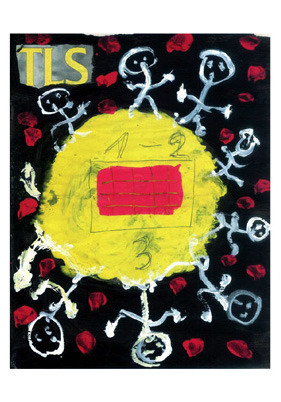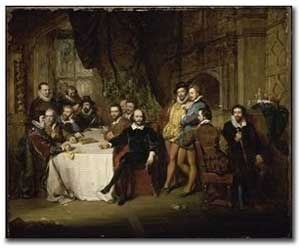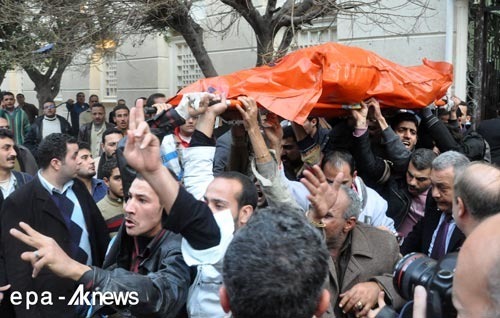Peter Stothard's Blog, page 85
January 24, 2011
TLS - as another sees us
 Some homages to the TLS cover have appeared in a gallery in Marseilles.
Some homages to the TLS cover have appeared in a gallery in Marseilles.
In place of the offerings that reader know well enough there are paintings and collages of a broken red cross, a black arrow over a child's wood and a meeting of stick men around a yellow table.
I like to think they are offered in a generous spirit. The only one alien to our own spirit is the meeting around the table: the TLS is not famed for formal meetings although the yellow is lovely.
The artist is Claude Royet-Journoud.
Brief research shows that he is not always well loved at home.
In 1972 when Gallimard publishes a 96 page book entitled Le Renversement, the critic of Le Figaro is unimpressed. Under the title "So much white, so much white", he writes "That much white would certainly inspire dreams. Why not of a first communion procession in a snowy field ?" "Can you then be surprised that our contemporaries don't seem to give a damn about poetry or poets! The latter - or their publishers - need only stop taking them for idiots."
In 1978 Gallimard publishes a 112 page book by Royet-Journoud entitled La notion d'obstacle. The man from L'Humanité comments: Arranging ten lines (the first of which repeats the title, vois ci ) on six pages does not strike me as such a feat; nor does placing one word, "fragility", all alone in the middle of a page. It's as if the last century's Mallarméan enterprise had degenerated into an intellectualism which is naive and, in the last analysis, without perspectives.
Such outbursts, according to one defender of our artist, 'border on an infringement of creative freedom'. Accusations such as intellectual naivete or scorn for the public deny literature its rightful activity, and are 'closer to denunciation than critical discussion'.
At the TLS we too prefer critical discussion to denunciation but are not surprised when, from time to time, the objects of TLS articles mistake one for the other.
I look forward to future TLS covers by M. Royet-Journoud in the very best spirit of our trade.
January 17, 2011
And as well as Zoe Cormack. . .
I did not intend to return from Alexandria with a renewed interest in Middle Eastern and African politics. That all seems part of a long ago newspaper-editor past. But after arriving there in the aftermath of the Two Saints church bombing, listening to the anxieties of Egyptians at the division of Sudan, the threat to their Nile water and then the jasmine guns of Tunis, the sounds of David Cameron expatiating today about public service reform seem both forgettable and replaceable. My Sudan Watch is going to continue through Zoe Cormack's new anthropological blog which neatly mixes the necessaries of politics with the unnecessaries that we need for understanding wherever we are or have been. I am now looking for something on-line that will keep me equally well connected with the city in which I have spent these strange last two weeks of new year days and nights.
January 15, 2011
Pumps of Cairo
 Even the most casual student of Egyptian history knows that flooding plays a big part in it.
Even the most casual student of Egyptian history knows that flooding plays a big part in it.
The slightly less casual will know that, since the building of the Aswan damn in the days of President Nasser and the great Soviet engineers, the Nile has ceased the inundations that brought prosperity and perils for all the makers and admirers of pyramids.
So to arrive in Cairo yesterday and find the roads under varyingly many feet of water was mildly alarming - and not just because I had a plane home to catch.
My companions - one of them of about my approaching-sixty age - said that he had lived in the Egyptian capital all his life and could not recall anything like the brown, bottle-bobbing torrents that were usually his roads to the airport.
If this were true, the locals seemed to be doing well - rather better than the British when afflicted by our much more regular snow. There were ancient pump-lorries at work (well. ancient for a pump-lorry) and drivers seemed to recognise that single file through the shallow part of the road would produce better results for all than a mass dash through the deep ends.
The bridge to the airport was partially blocked by a chicane of flooded cars. But the patience of the other motorist was saintly, by British standards as well as by the hooting traffic madness I had just left behind in Alexandria.
The cause, it seemed, was no more than heavy rain - in which there were drownings around the whole region - but the response suggested to me that the rules of flood-life still survive deep in the Heliopolis gene pool.
January 9, 2011
On David Hart in Alexandria
 From an excellent obituary in Saturday's Financial Times, purchased a day late in Alexandria in a process going back to before the internet age, I discover that my old friend, David Hart, has died. I look forward to comparing other obits of the man whom the FT headlines as 'the flamboyant libertarian who helped Thatcher defeat the miners'. I particularly liked the line by Brian Groom that David was 'an extrovert ex-hippy who lived the life of the English establishment too extravagantly to be part of it'. He was assuredly a man who saw nuance and bias in newspapers as an artform of especially exquisite sensibility, whether it was practised for or against the causes in which he believed. It will be hard in reading the accounts of his life to avoid imagining him reading them too, or imagining that in some way he wrote some of them.
From an excellent obituary in Saturday's Financial Times, purchased a day late in Alexandria in a process going back to before the internet age, I discover that my old friend, David Hart, has died. I look forward to comparing other obits of the man whom the FT headlines as 'the flamboyant libertarian who helped Thatcher defeat the miners'. I particularly liked the line by Brian Groom that David was 'an extrovert ex-hippy who lived the life of the English establishment too extravagantly to be part of it'. He was assuredly a man who saw nuance and bias in newspapers as an artform of especially exquisite sensibility, whether it was practised for or against the causes in which he believed. It will be hard in reading the accounts of his life to avoid imagining him reading them too, or imagining that in some way he wrote some of them.
I cannot find it in me to reminisce too much now (maybe later) except to recall a strange Suffolk garden afternoon in the early eighties with Edward Teller of the H-bomb, Ronnie Millar the playwright who wrote speeches for Thatcher, a Russian dissident recently freed from the Gulag and a local farmer or two. The conversation on what he always called 'soul politics' went around and round for hours, just as my daughter did on one of the Hart family bicycles.
And then to remember the smudgy letter on a bathroom wall which 'showed', in Russian, that Mr Gorbachev was funding Arthur Scargill
And the early morning that Diana died when I woke in his house in Scotland and had to scurry back to london to edit The Times and write our leading article on a British Airways breakfast menu.
And the squares of Cadbury's dairy Milk which came in silver bowls after dinner, exactly the same each time like every other dining and drinking tradition which he kept alive in his life long after his form of Motor Neurone Disease would have destroyed the impetus for niceties in most.
His series of Christmas cards, showing himself in surreal guises, ended in one with a crooked smile that arived, as usual, three weeks ago,
'Single-mindedness in a cause' does not begin to do justice to his attitude to living.
All fondest thoughts from here to the extended family, of mothers, children and idealists, of which he was so proud to be a part.
January 8, 2011
Porphyrio Porphyrio
 This blog has not died, lest visitors be concerned. It has merely been itself off visiting, in places where feeble wifi and feebler equipment planning, have made silence the easier course.
This blog has not died, lest visitors be concerned. It has merely been itself off visiting, in places where feeble wifi and feebler equipment planning, have made silence the easier course.
I feel I should have something serious on which to report - like Mary Beard on the Cambridge candidates' pool and birthday pig-sticking.
But only one thought has arrived today so far, the peculiar pleasure of seeing that beautiful big-footed, big-flapping bird, the purple moorhen, on the filthy shores of Lake Mareotis this morning; and then seeing the same bird (porphyrio porphyrio for those who care) in the mosaic floor of a Roman villa in Alexandria this afternoon.
In the marsh it was plashing about with its wide red toes, a more comfortable means of travel for a waterbird without webbbed feet although can still swim well when required. When it flies, it looks always as though it has never flown before although, once again, this exemplarily spirited creature can cover long distances.
In the mosaic, at the so-called Villa of the Birds beside Egypt's best preserved Roman theatre, it is looking down at its food as though about to hold its prey in place for a strike. The Romans kept these birds as spectacular pets and did not eat them as a rule. I am not sure what the practice is in Alexandria today.
December 20, 2010
Souls of journalists dead and gone. . .
 Just as a butcher should have the best of Christmas turkeys, and the fireman's house deserves especially dutiful attention in a fire, the Obituaries Editor of a newspaper has to be sent off in style.
Just as a butcher should have the best of Christmas turkeys, and the fireman's house deserves especially dutiful attention in a fire, the Obituaries Editor of a newspaper has to be sent off in style.
Exactly thus, and very stylishly indeed, came the story of Tony Howard's life in The Times today (available to on-line subscribers and surely worth the charge in itself), a piece which the great man would have approved, honest, accurate, elegantly balanced between the goods and bads, ups and downs, failures and successes of our trade.
The way in which journalists were treated in obituaries was a matter of special interest to Tony, when he ran the obituary pages of The Times throughout the latter part of my decade as Editor. When I disagreed with his predecessors in that job, the cause was normally that some monstrous African dictator was getting the nil nisi bonum respect better fitting for a harmless Ministry of Agriculture mandarin. Any disagreement with Tony, however, was always in the opposite direction.
The former New Statesman Editor, Observer Deputy Editor and polymath of church and state approved of a stern approach. When some of us thought that a dead editor or columnist should be given the gentle treatment of the civil servant or headmaster, Tony tended to see them as worthy of the warts-and-all picture that a politician might get. He wrote some of these obituaries himself, sending off a brilliant colleague and rival once with a dissection of failed ambitions that would have been wholly appropriate for an assassinated monarch or disappointed dictator.
He did not always see the problems this caused. One reason was that he knew so much about so many people, having a thirst for gossip that exceeded all other journalistic thirsts. An obituary which he saw as kindly omitting many failings in a man might still contain material of considerable surprise to the subject's closest friends. . . .
Enough of this sharp reflection. It somehow seems wrong to write about him in a blog at all. A blog? He published some of my very first squibs in the New Statesman when I was barely a journalist of any kind. He failed to persuade me to join The Observer - for which I regularly thanked him when he later joined The Times. He was one of those few whose presence, especially when seated at the tiny window table of the Gay Hussar in Greek Street, was a signal that not everything in the trade had changed.
I'm always going to think of him there at that table - just as, in Andrew's breakfast cafe by the TLS offfice, I still think of my first Sunday Times boss, Roger Eglin, fuelling up, as he believed was absolutely essential, before writing his 2000-word, Saturday-morning Focus on the latest steel strike; and just as, in the All Souls corner of the Langham Hotel bar, once the BBC club, I think of Brian Hanrahan, who read books there when everyone else was plotting.
None of these eating houses is exactly a Mermaid Tavern. But then souls of journalism dead and gone are hardly Miltons or Shakespeares either.
They were just all three great men of journalism, all dead now just before this Christmas comes.
December 10, 2010
Beat the boys and spare the Rolls Royce
 My taxi-driver this morning was fully roused with solutions for the student violence that had last night left the Prince of Wales' Rolls Royce daubed with paint and the Cenotaph stained with urine.
My taxi-driver this morning was fully roused with solutions for the student violence that had last night left the Prince of Wales' Rolls Royce daubed with paint and the Cenotaph stained with urine.
Most of his plans involved corporal punishment of one kind or another - with additional sad reflections that by the time the villains reached the age of revolt it was probably too late. The time of suitable chastisement had already past.
I was strongly tempted to remind him of the good old days in sixteenth century Cambridge, described in Virgil's Schoolboys, the Poetics of Paedagogy in Renaissance England, a new book from OUP which, for reasons wholly unconnected with the current dissents, has been on my desk for the last few days.
Thanks to this excellent tome, I now know that, four hundred years ago, any applicant to become a Master of Gramer (as Grammar was then called) was required to come to Saynt Mary Church 'betwyne vii or eyght' to prove his skills in applying corporal punishment before the Proktour and Vycechauncelar.
His weapons were to be a rod and a 'palmer', a piece of wood, with a hole at one end, so that the application on the pupil's hand should produce a satisfactory blister.
For this formal inauguration a genuine pupil was not required. But a 'shrewde boy' had to be procured who did not mind being 'beyte openly' as long as he got his grote at the end of the day.
Acording to author, Andrew Wallace, this performance showed the dissonance between Virgil's generally perceived virtues and the forgetfulness of self that lay dangerously close to the heart of his art.
The original audience, in order to justify the physical entertainment, had to listen to arguments on grammatical points in the manner specified by Priscianus of Caesarea whose 6th century expertise was then deemed almost as important as the palmer to the proper teaching of Virgil.
How successful was this?
A note on page 211 makes clear that expectations of Priscian grammar skills were amended over the century as 'demand of the degree waned' and the ceremony was reduced to only only three or four grotes worth a year.
It is less clear when the 'beyting' bit of the grammar show ceased.
I know of at least one man in London who would like it brought back as soon as Nick Clegg can get the Lib Dems to agree.
At the current rate of change, that ought not to be too long.
December 3, 2010
World Cup Characters
 Last night, for reasons irrelevant to England's embarrassing abasement before the world cup football mafia, I happened to be reading a 2300-year-old book called Characters.
Last night, for reasons irrelevant to England's embarrassing abasement before the world cup football mafia, I happened to be reading a 2300-year-old book called Characters.
The author, Theophrastus, a student of Plato and Aristotle who influenced British writers for centuries until we thought we knew better, lists thirty types of humanity to avoid, every one of them, as far as I can gather, on parade in Zurich yesterday, including:
The Dissembler: the FIFA man 'more dangerous than vipers' who 'pretends not to have heard, claims not to have seen, says that he does not remember agreeing' and then votes for the bid that has made it most worth his while..
The Toady: one who takes part in a 'degrading association' of the sort that Prince William should not be asked to have with international shysters.
The Chatterbox: one who 'describes in every detail what he had for dinner' in between telling listeners to BBC Radio 5 Live how well everything is going in Zurich and how brilliantly our three graces, Beckham, Cameron and Windsor, were toadying on the national behalf.
The Rumour Monger: see above: but note rare and special praise for Radio Five's Zurich presenter, Peter Allen (ok, I was stuck in snow in a car at the time) who was reporting bravely on the simple fact that every excited commentator on his show was basing their optimism on each other or nothing or both.
The Man who has Lost all Sense: see above, and in the plural. Or for man read 'country' with the occasional rare citizen exceptions like Simon Jenkins and the investigators for Panorama and The Sunday Times.
The Superstitious Man: one who 'avoids weasels', quite hard in Zurich it seems, and when he sees Vladimir Putin staying at home knows exactly what that must mean
The Obtuse Man, the Self-centred Man, the Arrogant Man, the Late Learner, the Friend of Villains, the Shabby Profiteer.
Need I go on?
Another good reason for stopping the cuts in humanities and starting some elsewhere.
November 29, 2010
Athens Dialogues Two
 When the Onassis Cultural centre in Athens was first conceived (see previous post), its initiators could not have imagined the crisis of the city, the country and the international economic order into which it would be born.
When the Onassis Cultural centre in Athens was first conceived (see previous post), its initiators could not have imagined the crisis of the city, the country and the international economic order into which it would be born.
The orginal high ambitions of its first event - to hold Athens Dialogues about the contribution that Greek thought could make to modern problems - seemed even higher when the massed bands of international philosophers, historians, literary critics, political theorists, neuuroscientists and mathematicians, ktl (as they say in Greece) arrived at the golden-egg-in-the-glass-box past streets of uncollected rubbish, closed shops, empty offices and angry Athenian graffiti (only some of it it directed against our German friends).
The British philosopher, Simon Critchley, sounded an early warning that the Dialogue form of debate was no soft option.
In a culture when opinion is more fashionable than reasoning, and sensitivity to others' opinions is too often preferred to the stiletto needed to change minds, there was always the danger that we would have the The Athens Monologues instead.
At the end, after four days of talking, it was clear that some speakers had noted (or hardly needed to note) what Critchley had said, that others had struggled succesfully to abandon pre-prepared nostra, and others would probably never do so.
For a first event - in a place of high ambitions for future events - this was a very fine result.
The last session took place in what seemed a spirit of genuine self-criticicism.
There seemed significant support for the idea that next time there should be more 'going live' against other speakers and less statement of opinions that had died many decades before.
Questions - in the Socratic style - might be better than themes.
Greek materialist philosophy had been neglected. Too much Plato not enough Democritus or Epicurus. The TLS representative strongly seconded that.
Much time and sincerity had been spent thanking the organisers, arguably more than either politeness or economy required. But let me stray myself here. The Byzantinist, Dr Niki Tsironis, the conference's Academic Coordinator, much tried time-keeper and tireless attender at very moment's talking, could not be congratulated enough if we were all still there.
Critchley declared himself still 'just alive' on Saturday evening - and ended, as he began, with the admonition that dialogue is not the exchange of opinion in an atmosphere where everyone's opinion counts the same, that dialogue requires speakers to try to change minds not to comfort them, and that we could all do better as the noble process continued.
There seemed popular agreement that Greek politicians - temporary custodians of a palpably 'broken system' - could have usefully given up their own debates for a few days and joined ours. Politicians everywhere, of course, are among the very worst at dialogue - as every day's listening to them reminds us.
The Athens garbage strike, part of the non-verbal Greek protest against the German view of their economy, seemed yesterday, however, to be coming to an end.
November 26, 2010
Onassis's new golden egg
 Anyone in Her Majesty's Government inclined to doubt the work-rate and stamina of academics could have usefully spent the past four days in the splendid golden egg of the Onassis Cultural Centre in Athens.
Anyone in Her Majesty's Government inclined to doubt the work-rate and stamina of academics could have usefully spent the past four days in the splendid golden egg of the Onassis Cultural Centre in Athens.
From nine in the morning till nine at night hundreds of classicists and neuro-scientists, byzantinists and mathematicians, political theorists and genome pioneers have talked to each other - and to amazed onlookers - about what Greek thought, through these Athens Dialogues, can offer for the economic crisis and other crises of Europe and the globe.
By the end of each session, when the governmental orthodoxy for such affairs is of extended Retsina sessions and tax-payer funded souvlaki, the commonest sight has been of professors heading swiftly for their pillows, satisfied that those whose disciplines rarely bring them together have made connections they might otherwise never have made.
This post is being written in the aftermath of a still undigested diet of Euripides and Huntington's Chorea, Socrates and Steinbeck, the Euro and the attraction of lazy thinking, high-energy finance and low-energy memory. Hardened TLS readers - and there are many here and many more to come, I hope - have occasionally complained that the experience has been like having our paper in hand and not being able to turn the pages when an article is too unfamiliar, too hard, too unexpected or simply not what one wants to read at that moment.
But there is virtue in this sort of endurance. And it is already bringing rewards - with more of them too to come, I'm certain. Those who still think that endurance of dialogue in pale sunny Athens is nothing to enduring the snows of England may be unconvinced. At the moment I'm judging this first event at the new Onassis Centre a success. It may seem an untimely building, an extravagant egg of gold in a box of glass, but it is built without call upon the empty coffers of the Greek State. The spend-thrift, the greedy, the selfish, the thoughtless - almost any politican in fact - could have done worse than join us here this week.
It is against the spirit of the event to give particular praise to one's own compatriots. But when the criterion is crispness, clear direction, absence of unnecessary ornament and application of theory to practice, it sems to me that Cambridge politics and classics, Oxford pharmacology and London literary history offers exemplary lessons to other domains. Maybe that would have been better unsaid.
More importantly (and here there are names appropriately recorded, not least so that I don't forget them myself) I am determined to read and hear more from the Korean classicist, Hyun Jin Kim, the historian from Turkey Edhem Eldem, the Americans David Elmer, Peter Meineck and Sara Monoson. When I get back to London I will try to organise some links to show why.
Peter Stothard's Blog
- Peter Stothard's profile
- 30 followers




